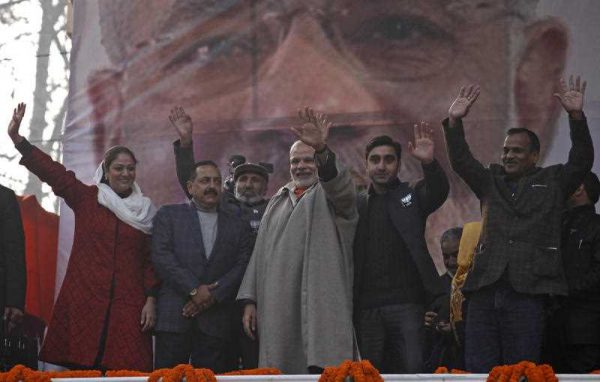The BJP’s role as the home of right-wing conservative Indian nationalists can be traced back to the pre-1947 era when Hindu nationalists not only demanded an independent India, but one completely dominated by Hindus. The Rashtriya Swayamsevak Sangh (RSS), the historical antecedent and parent organisation of the BJP, still wishes for a ‘Hindustan’ (a land of the Hindus).
In the last six months, there has been less of the economic development agenda than had been promised by the BJP and more rhetoric. To be sure, Modi is expounding slogans like ‘Clean India’, ‘Make in India’, ‘Act East’, ‘the business of government is not business’. And the drive towards cleanliness and sanitation at a national level has still been a high point of the prime minister’s rhetoric.
But perhaps more troublesome is Modi’s record on religious tolerance. In a pluralist society that welcomes and preserves the right of people to follow any religion or faith of their choice, the proposed federal Anti-Conversion Law is problematic. There is clearly demand among Hindu nationalists for measures to ban unfair and forced conversions across India. But at the same time, the anti-conversion movement has created a foundation for the RSS to push ahead with their ghar wapsi (‘homecoming’) camps — which provide Christians the opportunity to convert back to Hinduism.
Modi cannot let the religious nationalist agenda of some members of his movement distract him from the more pressing task of economic and social reform. The country desperately needs to amend its education system, address myriad problems in the areas of policing and law and order at both the national and state level and fix its antiquated public health care system. On the economic front, it must make doing business in India easier, and begin to deal with enormous problems in the informal sector issues that tend to disguise unemployment.
The Congress Party, before its defeat in the 2014 election, introduced a lot of socio-economic measures to address these structural challenges. But they were not successfully implemented. But existing reforms need to be buttressed by new measures at a state level.
The BJP-led government has displayed a surprising amount of policy continuity with its Congress-led predecessor. Six months, of course, may not be enough time to see the outcomes of Modi’s promises. But it is long enough see the outlines of the political strategy Modi is attempting to prosecute in order to implement his agenda.
Increasing state cooperation is critical if the central government is to thrive. The BJP has claimed victory in several state elections since Modi took office and is likely to win more. This could prove to be a good thing for implementing new policies. But increased BJP rule at state and national level also has problems. It makes the country more vulnerable to RSS-backed religious reformation. The RSS appears to be using the political strength of the BJP to continue with its work of cadre building, social service, dharamjagran (religious awakening) and matantar (conversion) among certain constituencies. A Hindu nationalist agenda at the state level could be counterproductive for Modi’s economic agenda, as well as undesirable in its own right.
In 2015 the BJP is likely to take power in Delhi and Bihar — the only sub-national governments going to polls this year. The real question for Modi, the man of 2014, is what does he actually stand for? Will he allow a Hindu nationalist agenda to derail his promises of economic and social development in India?
Deepanshu Mohan is a senior research associate at the Jindal School of International Affairs, O.P. Jindal Global University.

